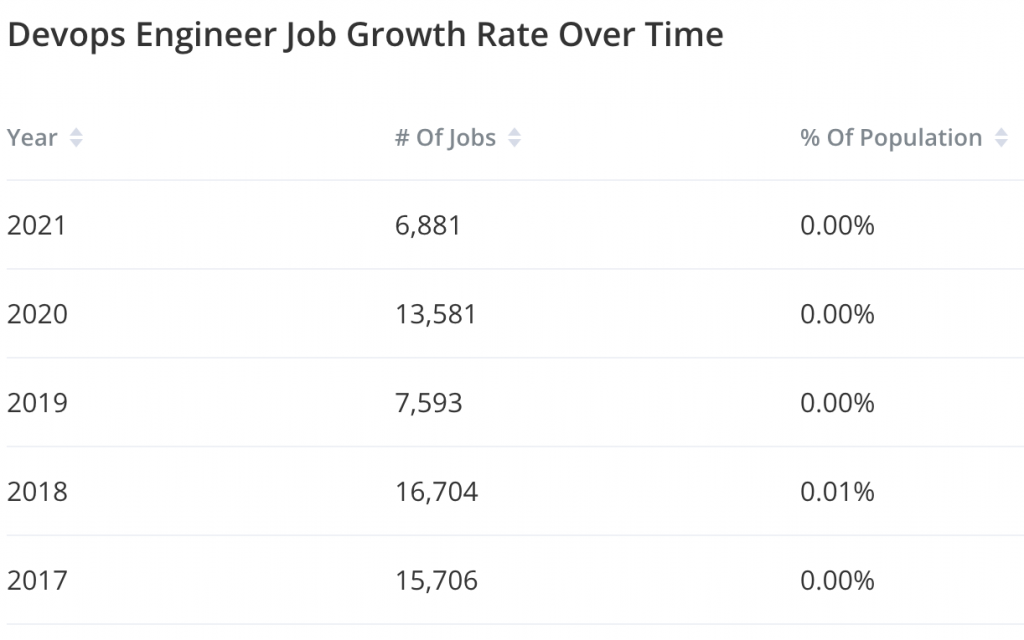Introduction
In the fast-paced world of DevOps, where the seamless integration of development and operations is paramount, successful DevOps engineer in the USA possess a unique set of skills that enable them to navigate this dynamic landscape with finesse. These professionals play a pivotal role in accelerating software delivery, enhancing quality, and fostering collaboration between teams. In this deep dive, we’ll explore the multifaceted skills that contribute to the success of DevOps engineers in the USA.
Why Mastering DevOps is Crucial For Engineers?

Source: DevOps Engineer Job Statistics
DevOps professionals play a pivotal role in accelerating software delivery, enhancing quality, and fostering collaboration between teams. In this deep dive, we’ll explore the multifaceted skills that contribute to the success of DevOps engineers in the USA.
Accelerated Software Delivery
Faster Time to Market:
DevOps practices emphasize automation, collaboration, and continuous integration and delivery (CI/CD). This results in accelerated software development cycles, allowing organizations to bring new features and updates to market more swiftly.Competitive Advantage:
Organizations that adopt DevOps can respond rapidly to market changes and customer demands. This agility provides a competitive advantage, enabling them to stay ahead in the fast-paced tech industry.
Improved Collaboration
Breaking Down Silos:
DevOps promotes a culture of collaboration, breaking down the traditional silos between development and operations teams. Engineers collaborate seamlessly, leading to better communication and shared responsibility for the entire software development lifecycle.Cross-Functional Teams:
Engineers in DevOps work in cross-functional teams where they gain exposure to various aspects of software development and operations. This multidisciplinary approach enhances their skills and understanding.
Enhanced Quality
Automated Testing:
DevOps encourages the implementation of automated testing throughout the development pipeline. This results in improved code quality, reduced defects, and greater confidence in software releases.Continuous Monitoring:
Engineers in DevOps employ continuous monitoring tools to detect issues in real time. This proactive approach minimizes downtime and improves the overall user experience.
Increased Efficiency
Automation and Efficiency:
DevOps engineers automate repetitive tasks, from infrastructure provisioning to code deployment. This automation reduces manual errors, improves efficiency, and frees up engineers to focus on higher-value activities.Resource Optimization:
DevOps practices optimize resource usage, whether it’s cloud infrastructure or on-premises servers. Engineers can scale resources up or down as needed, reducing operational costs.
Resilience and Recovery
Resilient Systems:
DevOps engineers design systems for resilience, ensuring that they can withstand failures and recover gracefully. This approach minimizes service disruptions and enhances reliability.Rapid Recovery:
In the event of an issue or failure, DevOps practices enable engineers to rapidly diagnose and resolve problems, minimizing downtime and user impact.
Career Advancement
High Demand:
DevOps expertise is in high demand. Engineers who master DevOps are highly sought after in the job market, leading to increased career opportunities and competitive salaries.Versatility:
DevOps engineers possess versatile skills that extend beyond traditional roles. They can transition into various positions, from DevOps architect to site reliability engineer (SRE), broadening their career paths.
Continuous Learning
Stay Current:
DevOps is a continually evolving field. Engineers must stay current with the latest tools, technologies, and best practices, fostering a culture of continuous learning.Professional Growth:
Mastering DevOps not only enhances technical skills but also promotes personal and professional growth. Engineers become adept at problem-solving, decision-making, and teamwork.
Also read: How to Stay Up-to-Date on the Latest DevOps Trends in the USA
DevOps Engineer Skill Set

In the dynamic world of DevOps, a diverse skill set is the linchpin that enables DevOps engineers to bridge the gap between development and operations successfully. Beyond technical proficiency, DevOps engineers possess a unique combination of soft skills that make them invaluable assets in the realm of software development and operations. In this chapter, we’ll delve into the essential skills that define a DevOps engineer’s profile.
Analyzing the Essential Skill Set
DevOps engineers are known for their versatility, and their skill set reflects this adaptability. Let’s explore the core skills that make DevOps professionals indispensable:
Scripting and Coding Skills:
Proficiency in scripting languages like Python, Ruby, and Shell is paramount for DevOps engineers. These languages empower them to write automation scripts, create custom solutions, and integrate tools seamlessly.Configuration Management:
Tools like Ansible, Puppet, and Chef are staples in a DevOps engineer’s toolkit. They use these tools to automate and manage system configurations, ensuring consistency and reproducibility.Containerization and Orchestration:
With the rise of containerization technologies like Docker and orchestration platforms like Kubernetes, DevOps engineers must possess expertise in managing containerized applications and microservices.Cloud Computing:
Many modern projects leverage cloud platforms like AWS, Azure, or Google Cloud. Familiarity with these platforms, including infrastructure as code (IAC) practices, is essential for DevOps engineers.Collaboration Tools:
Proficiency in collaboration tools such as Slack, JIRA, Confluence, and version control systems like Git enables effective communication, project management, and code collaboration.Security Awareness:
DevOps engineers must understand security best practices to embed security throughout the development lifecycle. This includes securing code, containers, and infrastructure.Problem-Solving Prowess:
Rapid troubleshooting and problem resolution are key skills. DevOps engineers are adept at identifying issues, diagnosing root causes, and implementing solutions to minimize disruptions.
Technical Proficiency and Soft Skills
While technical skills are foundational, soft skills are equally vital for DevOps engineers:
- Effective Communication: DevOps engineers act as bridges between development and operations teams. Effective communication is essential for conveying ideas, addressing concerns, and fostering collaboration.
- Teamwork and Collaboration: DevOps emphasizes breaking down silos. DevOps engineers are team players who work closely with developers, operations staff, and other stakeholders to achieve common goals.
- Adaptability: The technology landscape evolves rapidly. DevOps engineers must adapt to new tools, practices, and industry trends to remain effective.
- Critical Thinking: DevOps engineers are problem solvers. They analyze complex issues, identify root causes, and devise innovative solutions to improve processes and system performance.
- Continuous Learning: DevOps engineers are committed to continuous learning. They stay updated on emerging tools, practices, and technologies to remain at the forefront of their field.
- Strategic Thinking: DevOps engineers align their efforts with overall business goals and objectives. This strategic perspective ensures that DevOps practices drive tangible value for the organization.
The combination of technical proficiency and soft skills makes DevOps engineers versatile professionals who can navigate the complex landscape of software development and operations. They excel not only in automating processes but also in fostering collaboration, innovation, and problem-solving.
Essential Skills of a Successful DevOps Engineer in the USA

Successful DevOps engineers in the USA are multi-faceted professionals with a diverse skill set encompassing technical expertise, collaboration, problem-solving, and a deep understanding of DevOps culture.
Technical Proficiency
Understanding the Tech Stack:
Successful DevOps engineers have a comprehensive understanding of the technology stack they work with. This includes familiarity with programming languages, databases, web servers, and cloud platforms.DevOps Tools Mastery:
Proficiency with DevOps tools is non-negotiable. Engineers should be well-versed in tools like Docker, Kubernetes, Jenkins, Ansible, and Terraform, among others.Scripting and Coding Skills:
Scripting languages like Python, Bash, and PowerShell are essential for automation. DevOps engineers should be capable of writing code to automate tasks and workflows.Infrastructure as Code (IAC):
IAC tools like Terraform and CloudFormation are crucial for provisioning and managing infrastructure. Engineers need to be skilled in writing IAC scripts.
Continuous Integration and Continuous Deployment (CI/CD)
Pipeline Creation:
DevOps engineers design and implement CI/CD pipelines to automate the building, testing, and deployment of software. They understand the intricacies of pipeline tools like Jenkins and GitLab CI.Version Control:
Proficiency in version control systems such as Git is essential. Engineers should understand branching strategies, merging, and resolving conflicts.Testing and Quality Assurance:
DevOps professionals work closely with QA teams to integrate automated testing into the CI/CD pipeline, ensuring high-quality software releases.
Cloud Computing
Cloud Platforms:
The ability to work with major cloud providers like AWS, Azure, and Google Cloud is crucial. DevOps engineers configure, deploy, and manage applications in the cloud.Scalability and Load Balancing:
They understand how to design scalable architectures and use load balancing to ensure high availability and performance.Security Best Practices:
Security is a top priority. DevOps engineers implement security best practices, including identity and access management, encryption, and compliance.
Automation and Orchestration
Infrastructure Automation:
Successful DevOps engineers automate infrastructure provisioning and management using tools like Ansible, Puppet, or Chef.Task Automation:
They automate routine tasks, such as system backups, log rotation, and patch management, to improve efficiency.Orchestration:
DevOps professionals orchestrate complex workflows, coordinating actions across multiple systems and services.
Collaboration and Communication
Cross-Team Collaboration:
Collaboration is at the core of DevOps. Engineers work seamlessly with development, operations, and QA teams, breaking down silos.Effective Communication:
Communication skills are vital. DevOps engineers communicate technical information clearly and concisely, ensuring everyone is on the same page.
Problem-Solving and Troubleshooting
Analytical Skills:
Successful DevOps engineers possess strong analytical skills. They can analyze complex problems, identify root causes, and propose effective solutions.Troubleshooting:
When issues arise, engineers excel at troubleshooting. They use a systematic approach to diagnose and resolve problems quickly.
Soft Skills
Adaptability:
The DevOps landscape evolves rapidly. Engineers must adapt to new tools, practices, and technologies.Teamwork:
Collaboration is a cornerstone of DevOps. DevOps engineers work effectively in cross-functional teams.Time Management:
Efficient time management ensures that engineers can juggle multiple tasks and priorities effectively.
DevOps Culture and Philosophy
Understanding DevOps Principles:
DevOps engineers grasp the core principles of DevOps, including automation, collaboration, and a focus on delivering value.Continuous Learning:
They have a growth mindset, embracing continuous learning and improvement.Resilience:
In a high-pressure environment, DevOps engineers remain resilient, maintaining composure in challenging situations.
Documentation and Knowledge Sharing
Documentation:
Engineers document configurations, processes, and procedures to ensure transparency and repeatability.Knowledge Sharing:
They actively share knowledge with team members, contributing to a culture of learning and growth.
Security Awareness
Security Practices:
DevOps engineers are well-versed in security best practices, understanding the importance of securing applications and data.Compliance:
They adhere to compliance standards and regulations relevant to their industry.
Also read: A Beginner’s Guide to DevOps: Understanding, Implementing, and Thriving – US Guide
Conclusion
Successful DevOps engineers in the USA are multi-faceted professionals with a diverse skill set encompassing technical expertise, collaboration, problem-solving, and a deep understanding of DevOps culture. They excel in automating workflows, ensuring the reliability and security of systems, and driving continuous improvement. As the demand for DevOps engineers continues to grow, acquiring and honing these skills is crucial for those aspiring to thrive in this high-impact role. Whether you’re just beginning your DevOps journey or seeking to enhance your existing skills, this deep dive provides a comprehensive overview of the skills that define success in the world of DevOps.



















